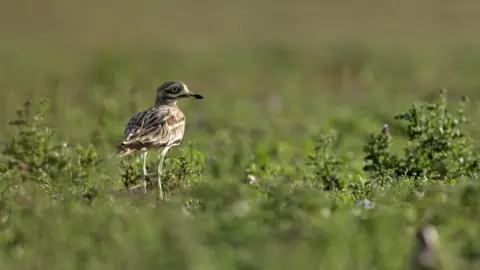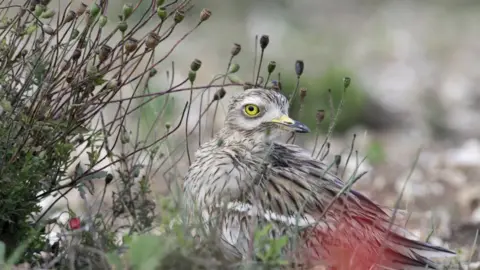Rare grassland bird numbers expected to rise in Wiltshire
 Andy Hay, RSPB
Andy Hay, RSPB A Wiltshire nature reserve is expecting record numbers of a rare grassland bird this year as a decades-long conservation project starts to pay off.
Stone-curlews migrate to southern parts of the UK from southern Spain and Northern Africa every year.
Nesting on open ground, their numbers have plummeted since the 1930s due to the rise of industrial agriculture.
But last year RSPB-run Winterbourne Downs near Salisbury saw 11 breeding pairs raise 19 young.
Wardens are hoping that many of the crow-sized, yellow legged birds will return this year to nest.
The reserve is part of a conservation project launched by the RSPB in the 1980s to protect the stone-curlew's habitat.
Last year, 30 breeding pairs were recorded on RSPB nature reserves.
 Andy Hay, RSPB
Andy Hay, RSPBConservationists are also working with farmers and land-owners to protect suitable nesting sites in counties including Norfolk, Suffolk, Somerset and Gloucestershire.
Nick Bruce-White, director of RSPB England, said: "With much of our wildlife-rich grasslands and 97% of our wildflower meadows lost since the 1930s, it is only through working in collaboration with like-minded farmers, landowners and partners that we can continue to see a rise in species like the stone-curlew here in England."
But he warned delays to government schemes to help farmers protect nature, such as the environmental land management scheme (ELMS), were putting the future of stone-curlews in jeopardy.
ELMS is being developed to replace EU agricultural subsidies post-Brexit and will pay farmers for work to help protect the environment, such as cutting pesticide use and working towards net zero.
But farmers have criticised the government for a lack of clarity over what the new scheme will entail and when exactly it will be rolled out.
Mr Bruce-White said: "There is much to be done to secure a long-term future for this species in the wider countryside.
"Now, more than ever, our farmers need the guarantee of support from the government of the UK through these schemes, empowering farmers to deliver for wildlife, climate and long-term food security".

Follow BBC West onFacebook, TwitterandInstagram. Send your story ideas to: [email protected]
